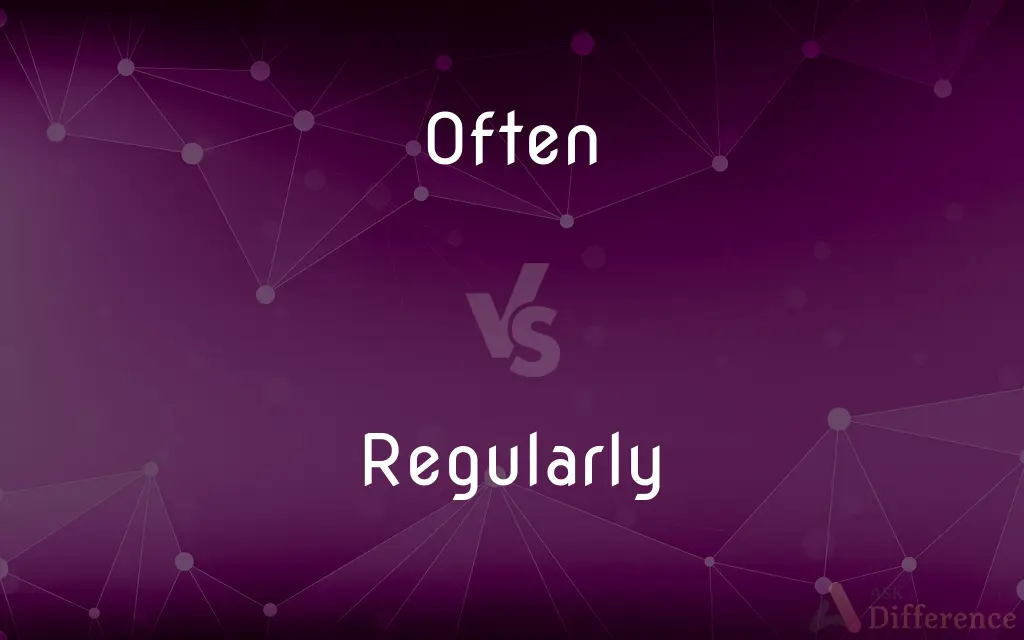Often vs. Regularly — What's the Difference?
By Maham Liaqat & Urooj Arif — Updated on April 26, 2024
Often implies frequency that can vary greatly, ranging from several times a day to a few times a month, while regularly suggests a consistent, recurring pattern at fixed intervals.

Difference Between Often and Regularly
Table of Contents
ADVERTISEMENT
Key Differences
Often is used to describe an action that occurs frequently, but without a fixed pattern or schedule. Whereas, regularly connotes a more structured recurrence, following specific time intervals.
Often can imply occurrences at irregular intervals that might be frequent but unpredictable. On the other hand, regularly indicates predictability and routine in the timing of occurrences.
Often may suggest a qualitative aspect of frequency, meaning something happens many times. While, regularly emphasizes the quantitative aspect, focusing on the systematic nature of the occurrences.
When describing habits, often may not necessarily convey adherence to a schedule, it simply means something happens many times. Whereas, using regularly implies a planned or habitual action that occurs at specific times.
In casual speech, often can be substituted with words like "frequently" or "many times," which are vague regarding actual intervals. Conversely, regularly aligns more closely with terms like "periodically" or "systematically," which suggest a clear, recurring pattern.
ADVERTISEMENT
Comparison Chart
Frequency
Variable, can be high or low
Consistent, follows a pattern
Regularity
No fixed intervals
Fixed intervals
Predictability
Less predictable
Predictable
Usage in speech
More qualitative; emphasizes repetition
More quantitative; emphasizes schedule adherence
Synonyms
Frequently, repeatedly
Periodically, systematically
Compare with Definitions
Often
Frequently occurring; many times.
She often goes to the cinema alone.
Regularly
With consistent frequency; systematically.
They regularly check the equipment for faults.
Often
In many instances or cases.
Often, the best solution is the simplest.
Regularly
In a regular manner; orderly.
The newsletter is published regularly.
Often
Commonly or habitually happening.
He often forgets his keys.
Regularly
At uniform intervals; periodically.
She exercises regularly every morning.
Often
At many times; repeatedly.
They meet often to discuss the project.
Regularly
At fixed times; routinely.
He takes his medication regularly at eight.
Often
More than occasional but not constant.
He is often late for appointments.
Regularly
Without exceptions; uniformly.
The laws apply regularly to everyone.
Often
"Often" is a song by Canadian singer the Weeknd. The track was released on July 31, 2014 as the first single from his second studio album, Beauty Behind the Madness (2015).
Regularly
With a constant or definite pattern, especially with the same space between individual items
Regularly spaced buildings
Leaves arranged regularly along the stem
Often
Many times; frequently.
Regularly
At uniform intervals of time
The reunion has taken place regularly every two years
Often
Frequently; many times.
I often walk to work when the weather is nice.
I've been going to the movies more often since a new theatre opened near me.
Regularly
On a habitual basis; usually
The person who regularly cuts your hair
Often
(archaic) Frequent.
Regularly
In a way that follows the normal pattern of inflection
A regularly inflected plural noun
Often
Frequently; many times; not seldom.
Regularly
Customary, usual, or normal
The train's regular schedule.
Often
Frequent; common; repeated.
And weary thee with often welcomes.
Regularly
Orderly, even, or symmetrical
Regular teeth.
Often
Many times at short intervals;
We often met over a cup of coffee
Regularly
In conformity with a fixed procedure, principle, or discipline.
Often
Frequently or in great quantities;
I don't drink much
I don't travel much
Regularly
Well-ordered; methodical
Regular habits.
Regularly
Occurring at fixed intervals; periodic
Regular payments.
Regularly
Having bowel movements or menstrual periods with normal frequency.
Regularly
Not varying; constant.
Regularly
Formally correct; proper.
Regularly
Having the required qualifications for an occupation
Not a regular lawyer.
Regularly
(Informal) Complete; thorough
A regular scoundrel.
Regularly
(Informal) Good; nice
A regular guy.
Regularly
(Botany) Having symmetrically arranged parts of similar size and shape
Regular flowers.
Regularly
(Grammar) Conforming to the usual pattern of inflection, derivation, or word formation.
Regularly
(Ecclesiastical) Belonging to a religious order and bound by its rules
The regular clergy.
Regularly
Having equal sides and equal angles. Used of polygons.
Regularly
Having faces that are congruent regular polygons and congruent polyhedral angles. Used of polyhedrons.
Regularly
Belonging to or constituting the permanent army of a nation.
Regularly
(Ecclesiastical) A member of the clergy or of a religious order.
Regularly
A soldier belonging to a regular army.
Regularly
A dependable loyal person
One of the party regulars.
Regularly
A clothing size designed for persons of average height.
Regularly
A habitual customer.
Regularly
With constant frequency or pattern.
We regularly buy lottery tickets from the corner store.
Regularly
Normally; ordinarily.
Noemi decided to dress regularly for the party, instead of going for an outrageous outfit.
Regularly
In a regular manner; in uniform order; methodically; in due order or time.
Regularly
In a regular manner;
Letters arrived regularly from his children
Regularly
Having a regular form;
Regularly shaped objects
Regularly
In a regular way without variation;
Try to breathe evenly
Common Curiosities
Is "often" suitable for describing routines?
Yes, but it doesn't necessarily imply a strict routine or schedule.
Can "regularly" be used to describe infrequent but consistent actions?
Yes, it can describe actions that occur consistently, even if they are not frequent.
Can "regularly" mean the same as "often"?
While both imply frequency, "regularly" also connotes fixed, predictable intervals.
Can "often" and "regularly" be interchangeable in some sentences?
They can be interchangeable in some contexts, particularly when the distinction between frequency and interval regularity is not critical.
What does "often" imply about frequency?
It implies frequent occurrence but does not specify regular intervals.
How do the implications of "often" differ in formal and informal contexts?
In informal contexts, it may simply mean "many times," while in formal contexts, it might suggest regularity without precision.
What context is "often" most appropriate for use?
"Often" is most suitable for contexts where frequency is emphasized without the necessity of a regular pattern.
How do "often" and "regularly" affect the tone of professional communication?
Using "regularly" in professional communication conveys precision and reliability, while "often" can suggest diligence but with less emphasis on predictability.
What type of activities are typically described using "regularly"?
Activities that are part of a routine or schedule, such as exercising, taking medication, or attending weekly meetings, are typically described as happening "regularly".
Is there a grammatical difference in how "often" and "regularly" are used in sentences?
Both words are adverbs and fit similarly in sentence structure; however, the context may influence the choice based on the emphasis on regularity or frequency.
Does "often" imply more randomness compared to "regularly"?
Yes, "often" implies occurrences at potentially random or varied intervals, whereas "regularly" suggests a structured and predictable pattern.
How does "regularly" enhance descriptions of habits or routines?
"Regularly" enhances descriptions by specifying that the habits or routines occur at predictable, uniform intervals.
Can the use of "often" be ambiguous in certain contexts?
Yes, because "often" does not specify the exact frequency, it can sometimes lead to ambiguity in understanding the precise frequency of occurrences.
How do cultural perceptions of time affect the interpretation of "often" and "regularly"?
Cultural perceptions of time can influence how these terms are understood; in cultures with a more flexible approach to time, "often" might be perceived as sufficient, whereas in more time-sensitive cultures, "regularly" might be necessary for clear communication.
Why might someone choose "regularly" over "often" in a scientific or technical report?
In scientific or technical contexts, "regularly" is preferred to communicate consistency and regular intervals, which are often crucial for clarity and precision in data reporting.
Share Your Discovery

Previous Comparison
Sate vs. Satiate
Next Comparison
Dirty vs. FilthyAuthor Spotlight
Written by
Maham LiaqatCo-written by
Urooj ArifUrooj is a skilled content writer at Ask Difference, known for her exceptional ability to simplify complex topics into engaging and informative content. With a passion for research and a flair for clear, concise writing, she consistently delivers articles that resonate with our diverse audience.














































